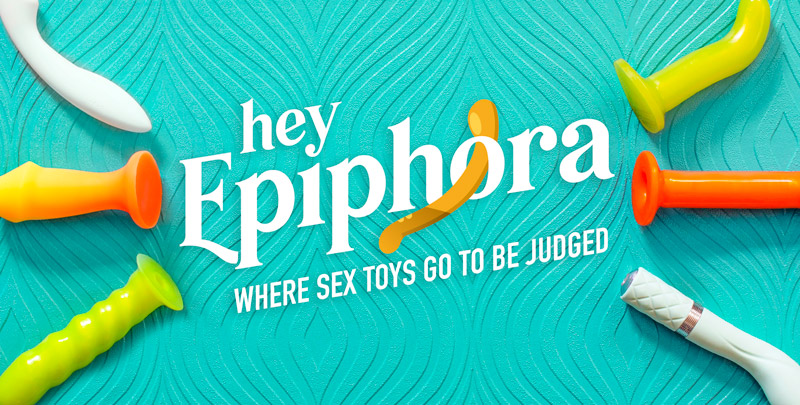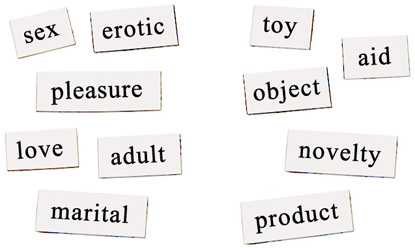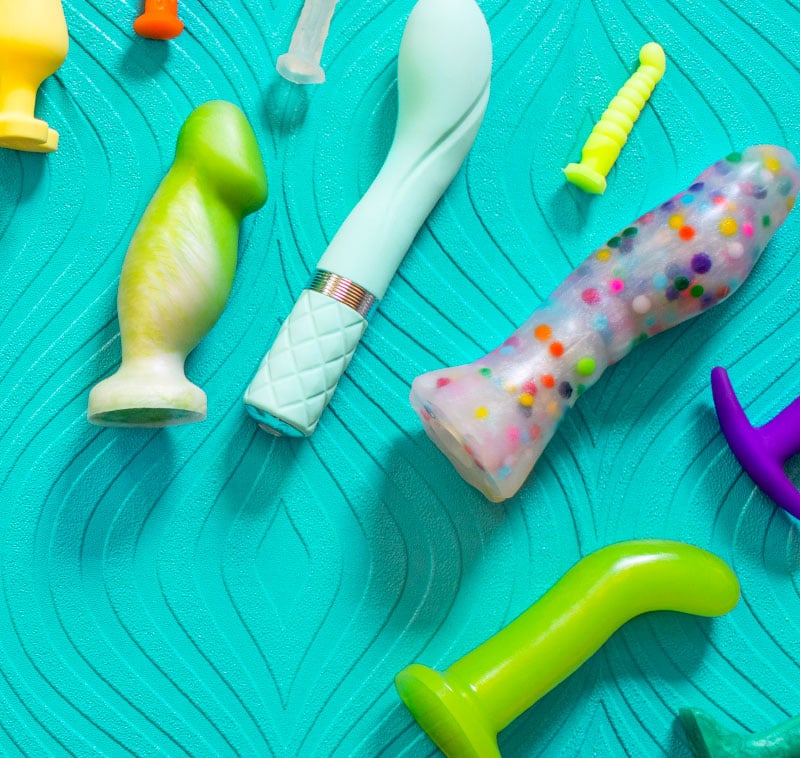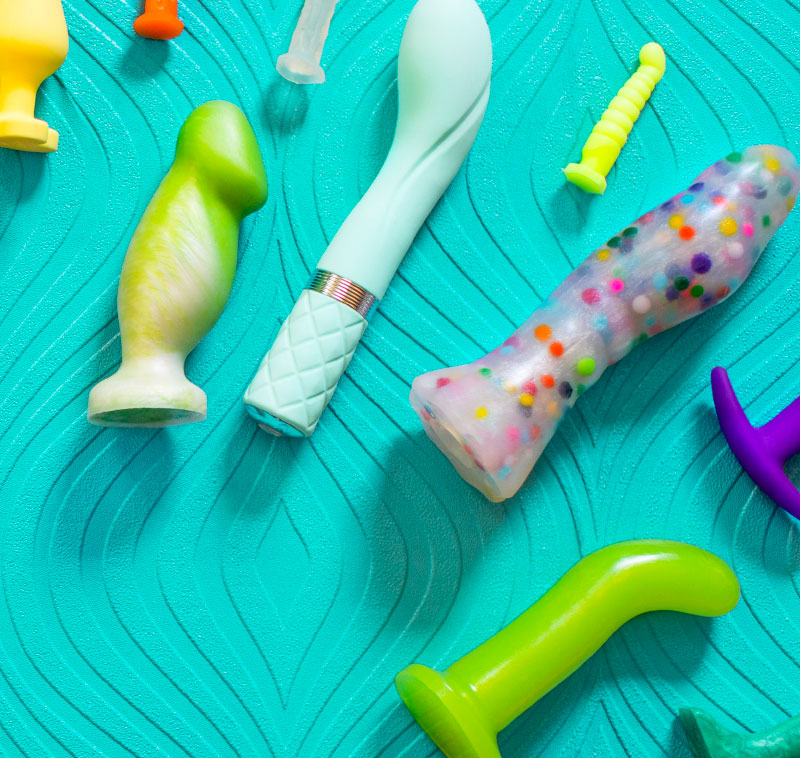While the rest of the world was chomping on chips and gluing their unblinking eyes to a TV on Superbowl Sunday, I was busy debating the relevance of the term “sex toys” on Twitter. Like you do, right?
It started with an interview question I received via email last week. It went like this:
I’ve noticed, after speaking to quite a few people in the industry, that no one seems to love the term ‘sex toy’ (or dildo, for that matter…). How do you feel about the word? Why do you think folks have an aversion to ‘sex toys’? What words do you like to use?
For as much time as I’ve spent thinking and writing about sex toys, I had never really considered that the term “sex toys” — which to me is pretty innocuous — might be unacceptable. Somewhat flabbergasted, I took to Twitter to commiserate with like-minded friends. But what ensued was much more thought-provoking than I anticipated. What really got the wheels turning was this tweet about the panels at XBIZ:
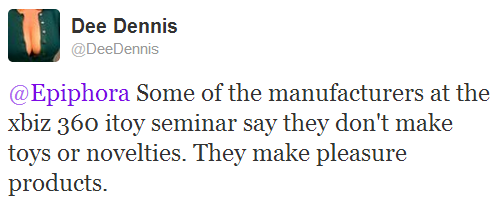
Manufacturers want to distance themselves from the term “novelty.” This I completely understand. It’s an old-fashioned industry word that no longer applies. It sounds trivial and frivolous. Novelties are sold at Spencer’s. Novelties are silly, laughable trinkets that end up in the garbage. When I hear the word “novelty,” I picture something like this:
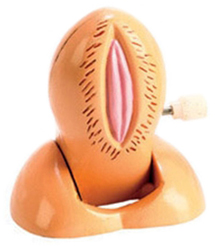
And while I definitely do need a wind-up vulva for my future office, that thing is not in the same league as a $150 rechargeable vibrator that comes with a sleek gift box, satin storage bag, warranty, and unnecessary but classy brooch.
Same with the outdated term “marital aid,” which is not only heteronormative and pious but also sex-shaming.
As I was trying to articulate why I favor the term “sex toys,”1 Metis Black (president of Tantus) chimed in with links to this article she wrote in 2008 and the ensuing butthurt response from AVN.
Related reading
Ah, the classic cry of “semantics!”. See, I’m of the camp that the words we use to describe things have an impact on how they are perceived. In the case of the sex toy industry, where we have to claw and fight to even be seen as legitimate at all, this is immensely important. I do not believe that, as Shakespeare famously wrote, a sex toy by any other name would feel as good. Call something a “dong” and nobody will want to put that inside themselves.
If you read this blog on a regular basis, you’ll notice that I prefer to call things what they are. I correct and call out coy idiots who use words like “C-spot” instead of clitoris, “big O” instead of orgasm, “battery-operated boyfriend” instead of vibrator, “dil” instead of dildo, and so on. Therefore, I like “sex toys” because it is straightforward. It is not a euphemism. It is specific and unwavering. Sex toys are simply toys meant for play, for use during sexual activity.
I do not believe that, as Shakespeare famously wrote, a sex toy by any other name would feel as good. Call something a “dong” and nobody will want to put that inside themselves.
At least that’s what I thought. When I engaged my boyfriend in this debate, he asked whether “sex” is too narrow, whether it implies a partner. I’ve always considered the word to be all-encompassing, but I can see his point. Still, every other option for that slot kind-of sucks.
These days it is hip and trendy for companies come up with their own cutesy little terms — “pleasure objects,” “erotic toys,” “love toys” — which are obviously marketing ploys more than anything else. But this clogs the industry with superfluous terms. Seriously, we could play mix-and-match all day with this stuff, but the bottom line is that something will always be the dominant term, and I don’t particularly want that dominant term to become “pleasure products.”
I’m not opposed to the idea of pleasure, obviously. And I do like the way “pleasure” refers to what a toy does, rather than when it is used. But I feel that when we replace “sex” with “pleasure,” we are sugarcoating, somehow rejecting “sex” as not representative of what we want to say. It feels like an aversion to the word “sex,” which distresses me greatly. We are also making the term less specific. “Pleasure” is so much more broad, and then you tack “products” onto it and suddenly you could be referring to music, food, really comfortable couches, etc.

I also feel that manufacturers invent terms like “pleasure products” as a way to artificially rise above their competition, and that’s kind-of shitty. Yes, LELO’s products are luxurious and high-end, but are they any more sophisticated than Je Joue’s? No. It is all marketing. I just can’t imagine myself saying “I have a massive pleasure product collection.” It sounds snooty. And although I am picky about what I’ll review, there’s no need for euphemisms when describing it.
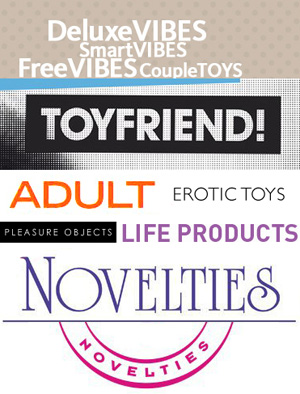
I collect sex toys. I have a shit ton of dildos, vibrators, and anal toys, which I routinely stick in my vagina, against my clitoris, and up my butt. I masturbate with them until I have an orgasm or three. Then I write about it in a matter-of-fact way. Because sex is normal, sex is healthy, and sex is important.
Seriously, we’re not helping shy people become okay with sex toys by coddling them with euphemisms. Euphemisms breed euphemisms. We all still censor ourselves when we talk about sex — a bad habit we need to break. Even in conversation with people, I have to bring myself to use the phrase “sex toys” rather than “adult” something-or-rathers. And I work with this stuff every day.
The word “toy” has its own baggage, of course. To some, it implies something childish and unimportant. You could argue that it is itself a euphemism. Even with these less than stellar connotations, though, I think it works much better than “product” or “object.” Those words sound sterile, unimaginative, like jugs of all-purpose cleaner sitting on a shelf. They are not associated with anything in particular.
“Toy,” on the other hand, is associated with a feeling. And that feeling is what we are trying, time and again, to convey to people. That sex toys are not just mechanical objects that will get in the way of your sex life. They are not ominous gadgets that will turn your girlfriend into a vibrator-wielding recluse. They are toys, meant for adding playfulness and fun to your sex life. In our sex-negative culture, where to even enjoy sex (especially as a woman) is somehow blasphemous, this is important.
Ultimately, “sex toys” may not be an absolutely perfect way of describing these things that I put on my genitals and in my orifices day in and day out, but I gotta work with what I have. “Sex toys,” by virtue of its directness, is most beneficial to my personal cause of normalizing these things. Which perhaps explains why I’ve been using it all along — without ever thinking about it.
